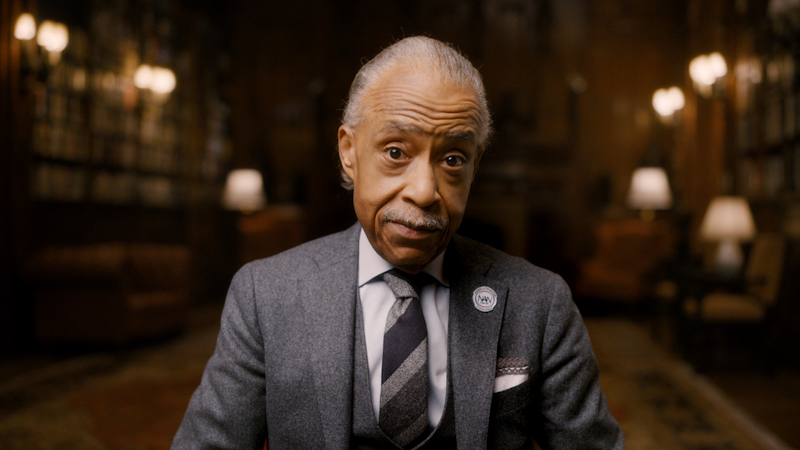There are two Al Sharptons. He's always been an outspoken reverend, civil rights leader, political activist and permanent scourge of the right-wing. But there was the 1980s and 1990s version of Sharpton, when he was overweight, had a pompadour, favored jogging suits and medallions, was more a local personality in New York City than a national one, and was far from an establishment figure, often doing battle with Ed Koch, Mario Cuomo and other Democratic elected officials.
Around the turn of the century, a different Sharpton emerged: He lost a dramatic amount of weight, wore expensive suits, ran for president in 2004, and eventually became an MSNBC host. He's still outspoken, often rushing to the sides of the families of young Black men killed by police, but now he's more likely to stand beside Democratic governors and senators than go to war with them.
Loudmouth, a new documentary about Sharpton that lands in theaters this week, goes back and forth between the two eras of Sharpton, telling the story of his role in numerous controversies over the decades, while following him in his present-day travails. Throughout, one thing is clear: the fire-breathing 1980s version of Sharpton was a much more compelling figure. I kept hoping for the parts set in the present to be over with so we could get back to the Koch, Dinkins and Giuliani eras.
This is demonstrated in an early scene, when Sharpton is feted at a swanky birthday party, with the governor and Senate Majority Leader, and president of MSNBC all showing up to toast him. We see him warmly greeted by then-Gov. Andrew Cuomo, the son of his old rival Mario, and Sharpton tells him "we're still here!" (Cuomo isn’t still here.) Politics have changed in the last three decades, with elected Democrats approaching racial matters in a much different way than, say, Koch did. But Sharpton has changed a lot, too. And it's easy to forget that Sharpton is only 68, and first became prominent at a surprisingly young age.
Director Josh Alexander cuts among a massive amount of news and archival footage, while interviewing Sharpton and getting his take on it. There's some fun stuff from Sharpton's early days working with James Brown, though all of the 1980s New York controversies, from the Howard Beach attack to Bernie Goetz to Crown Heights to Amadou Diallo. Sharpton's perspective is valuable, if self-serving, although his defense of his conduct in the Tawana Brawley case—when a young woman, backed by Sharpton, almost certainly falsely accused four men of raping her—requires pretzel-like rationalizations.
There's no question that Sharpton loves cameras and media attention, but not any more than most activists or elected officials. The film does, however, leave out some interesting potential angles. Sharpton's 2004 run for the presidency is mentioned briefly, but it skips that he was being advised, likely for rat-fucking purposes, by Roger Stone. Whether you love or hate Sharpton, Loudmouth is valuable as a window into all of that history, but you'll have to wade through the present-day material to get there.

